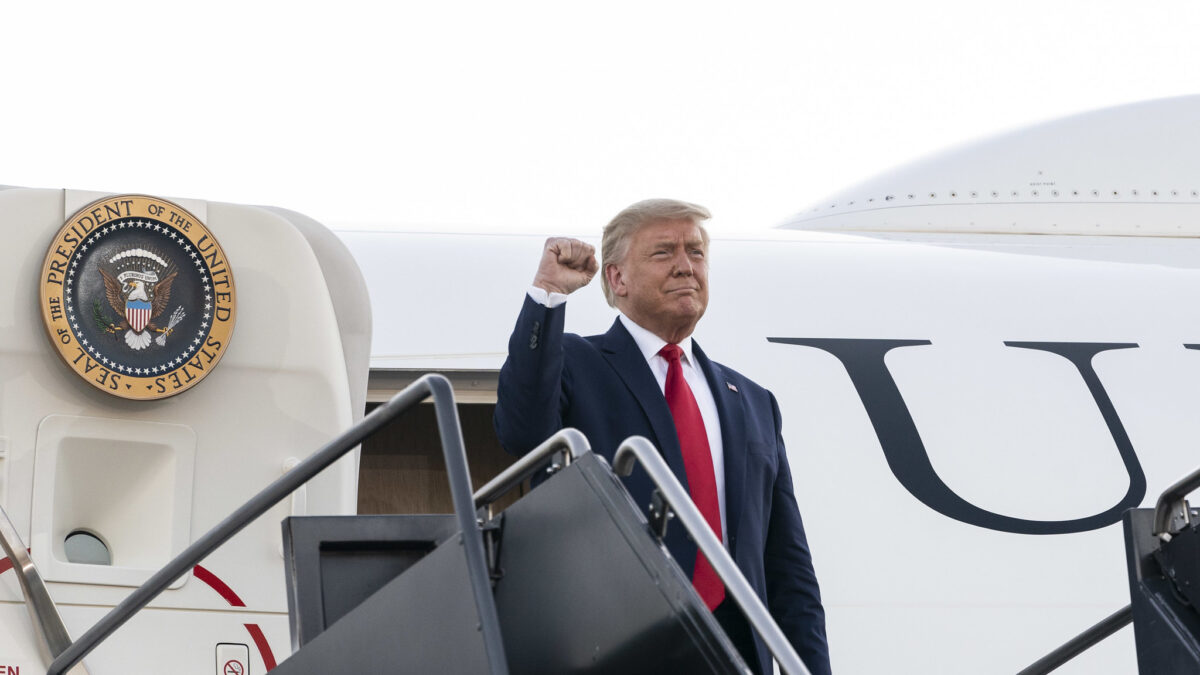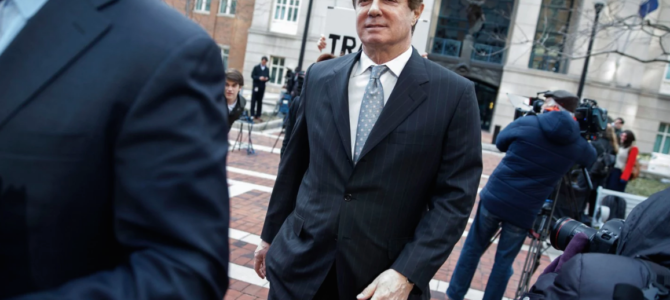
Choice quotes from Judge T.S. Ellis have dominated the news cycle since Friday, when the lively 77-year-old Ronald Reagan appointee put the screws to Special Counsel Robert Mueller’s team in a Russia investigation hearing on Paul Manafort’s motion to dismiss the criminal charges brought against him. But the spattering of isolated quotes fail to fully capture the deficiencies Ellis exposed in Mueller’s handling of the case.
A full read of the nearly 50 pages of transcript from the hour-plus long hearing bares eleven facts worth noting beyond their entertainment value.
Let’s take a look.
1. Everything Old Is New Again
Ellis struck immediately in the hearing, demanding Mueller’s lead attorney, Michael Dreeben, explain how the pending charges against Manafort, which consisted of multiple counts of tax evasion, bank fraud, and failing to report foreign bank accounts stemming from decades old conduct, could possibly fall within the scope of Mueller’s authority to investigate Russian interference with the 2016 Presidential Election.
Here’s the set-up:
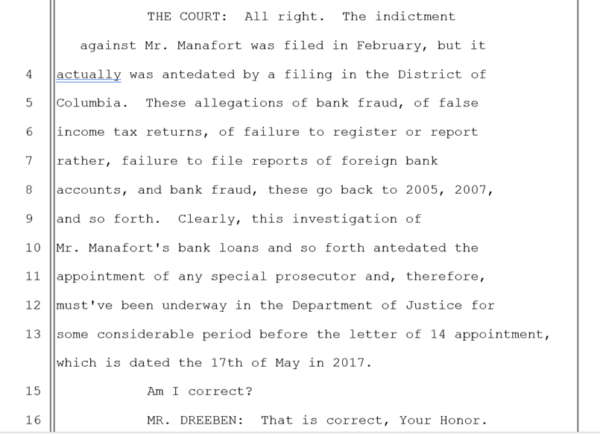
And the pitch:
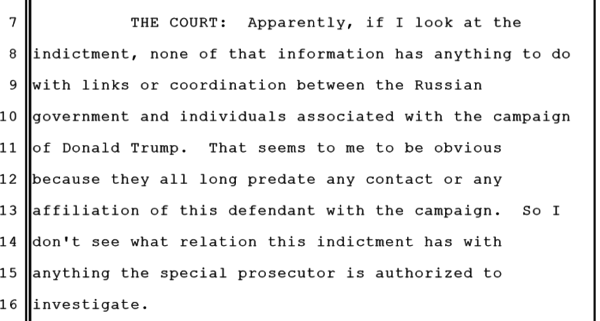
But Dreeben leaned in, claiming “our investigatory scope does cover the activities that led to the indictment in this case.”
Unpersuaded, Ellis retorted: “It covers bank fraud in 2005 and 2007?”
2. Lies, Damn Lies, And The Special Counsel Appointment
Dreeben responded by turning to Acting Attorney General Rod Rosenstein’s May 17, 2017, appointment order. That order, which Ellis noted “I have it right in front of me,” provided:
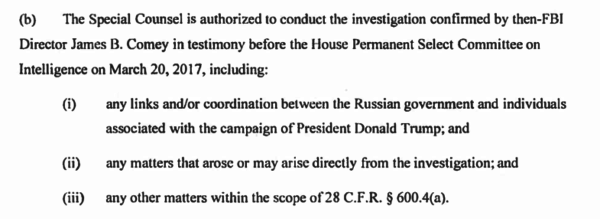
Relying first on subsection (i), Dreeben argued, albeit with little success as the next exchange shows, that Manafort’s association with the Trump campaign placed the criminal charges within the Special Counsel’s authority.
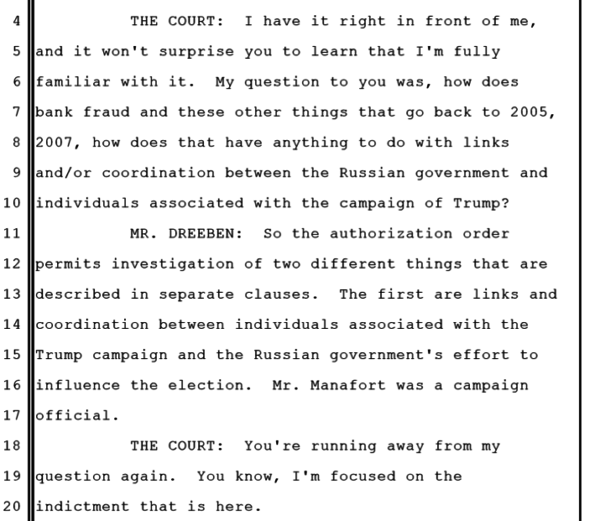
After some more back-and-forths (more on that later), and reading his audience, Dreeben changed gears, pointing to an Aug. 2 memorandum Rosenstein issued to Mueller’s office:
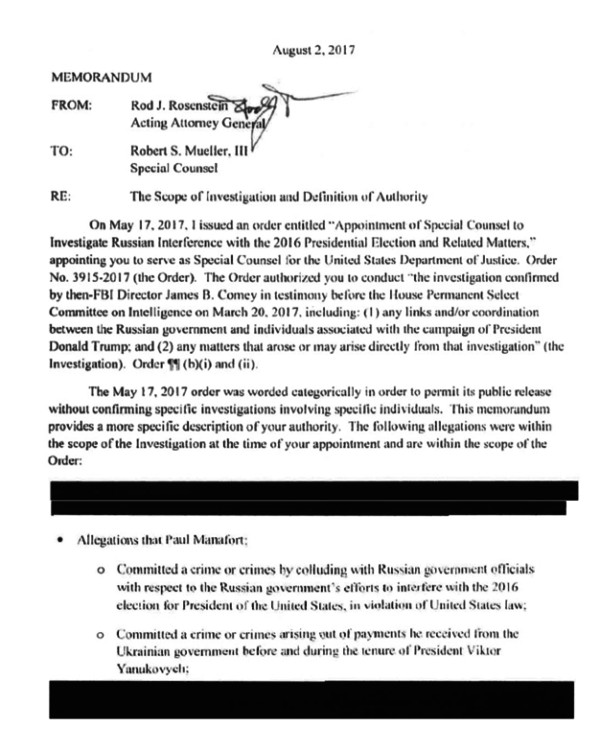
Relying on the second bullet, Dreeben argued the charges against Manafort were within Mueller’s authority, as seen here:

At that point in the hearing, Manafort’s attorney, Kevin Downing, took to the podium to rebut Mueller’s argument. Downing hit many points, but most forcibly stressed the complete absence of authority in the May 17 appointment order for Mueller to charge Manafort with the tax evasion, mail fraud, and other counts currently pending before the Virginia federal district court.
Dreeben countered Downing’s claim in the following exchange, arguing the May 17 order didn’t need to publicly state Mueller’s authority:
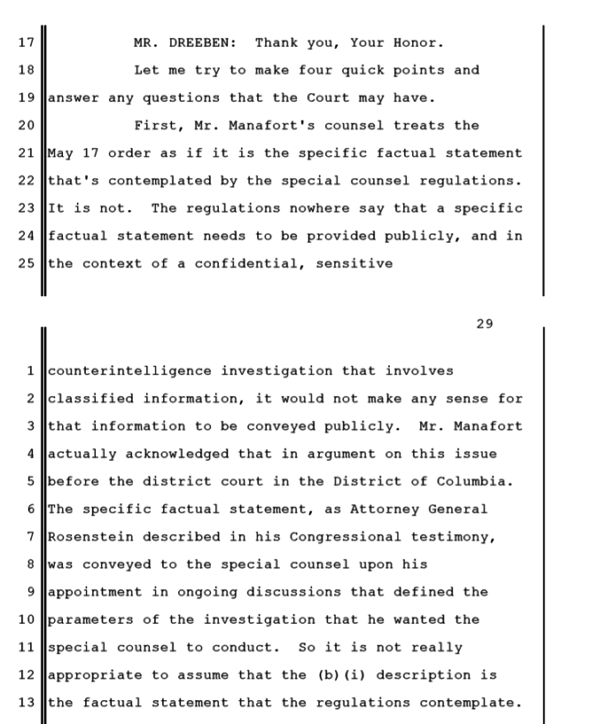
It was in response to this argument that Ellis stung Mueller’s team with one of his more colorful commentaries — and a more biting characterization of the Mueller argument as, “We weren’t really telling the truth in that May 17 letter.”
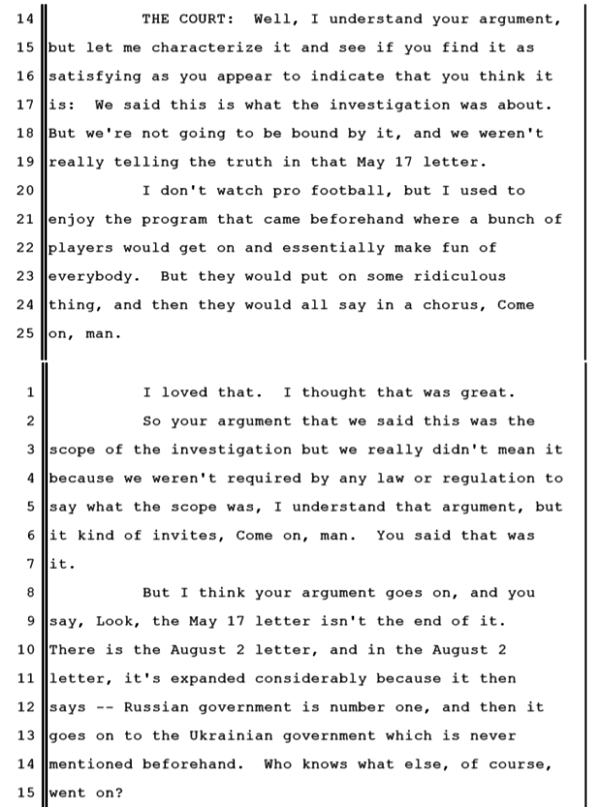
And yet Dreeben persisted, arguing Congress did not require the Attorney General (or acting Attorney General) to publicly define Mueller’s authority in the May appointment order.
3. Ukraine Ain’t Russia … Yet.
Ellis also challenged the Special Counsel’s office on its contention that the Aug. 2 letter provided Mueller’s team the authority to investigate Manafort’s alleged crimes. That letter purported to clarify that Mueller’s jurisdiction included investigating “crimes arising out of payments [Manafort] received from the Ukrainian government before and during the tenure of President Viktor Yanukovych.” But the May 17 appointment order spoke only of Russian-affiliated connections, and the indictment against Manafort identified only crimes related to his Ukrainian work.
This led Ellis on another tour down memory lane, to the time he visited the Ukraine in his youth. He noted the locals believed there was a huge difference between Ukraine and Russia.
Dreeben handled this exchange much better, explaining that Manafort had both Ukraine and Russia connections — and that the Ukrainian president whose government paid Manafort was Russian-backed.
4. How Exactly Did The Charges “Arise” Out Of The Mueller Investigation?
Dreeben floundered, however, when Ellis confronted him with the slight-of-hand Mueller’s team sought to advance by claiming the charges against Manafort “arose out of” the Mueller’s investigation.
Here’s how Ellis put it:

In response to the court’s questioning, Dreeben had no choice but to admit that the Special Counsel’s office “inherited” the preexisting investigation into Manafort from other U.S. Attorney’s offices — something, Manafort’s attorneys, in rebuttal, stressed Mueller’s office had never previously admitted.
5. He Might Sing Like A Canary — Or Compose His Own Score.
How exactly then did Manafort’s case end up with Mueller?
Ellis wanted to know:

And once Dreeben acknowledged the Special Counsel’s office inherited the “investigatory threads,” as he put it, Ellis knew the score — and tossed out his best line of the day — in this exchange.
He laid out Mueller’s real motive for charging Manafort:
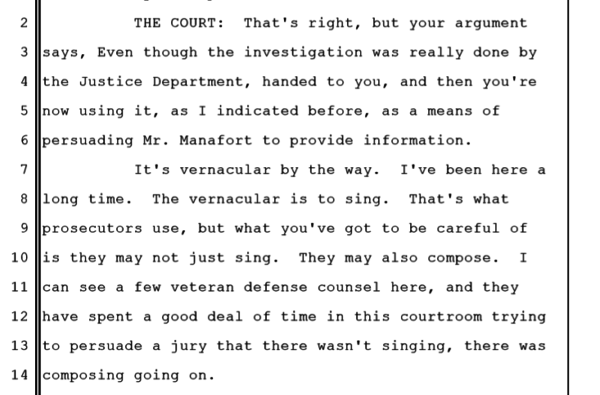
Ellis reiterated this point several more times during the morning argument, much to Mueller’s chagrin (and Trump’s delight).
First here:
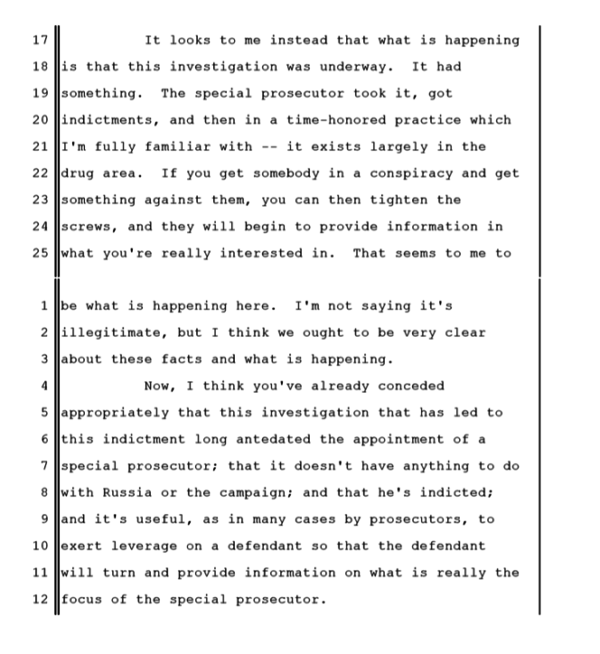
Then here, adding that the case against Manafort “has nothing whatever to do with” Mueller’s appointment:
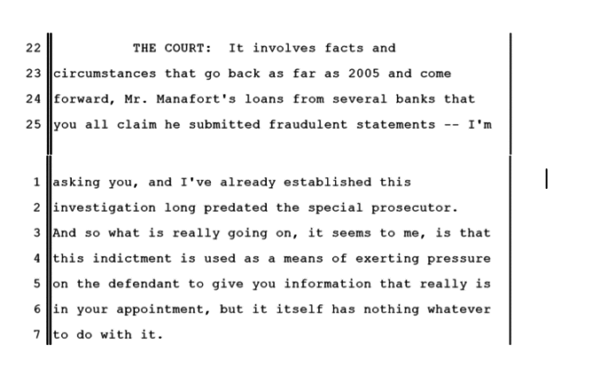
And finally, the bit Trump seized upon during his speech to the National Rifle Association on Friday:
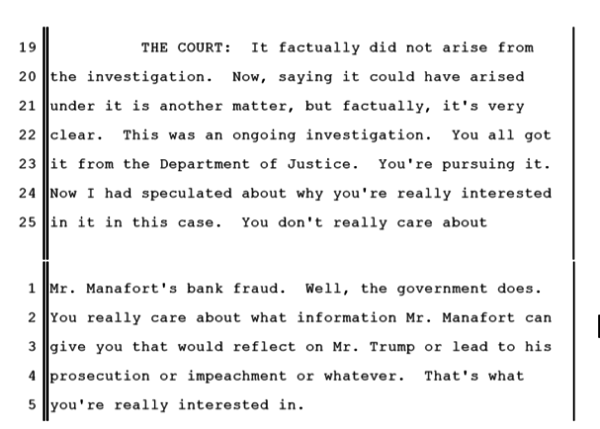
6. Why The Double Standard?
To bring home his point, Ellis also cornered Dreeben on Mueller’s seemingly incongruous treatment of Manafort and Trump attorney Michael Cohen. Mueller turned over the case against Cohen to the Eastern District of New York’s U.S. Attorney’s office, while retaining the equally unrelated-to-Russia case involving Manafort.
Why? To get Trump:
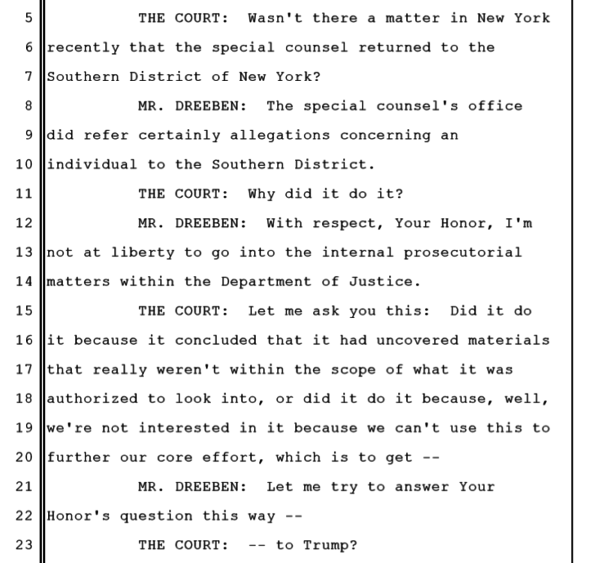
7. I’ve Got My Super-Duper Secret Decoder Ring
Ellis also called out the Special Counsel’s office for attempting to short-circuit his questioning by playing the “classified” card. The issue first arose when Dreeben referenced Rosenstein’s Aug. 2, 2017, memorandum that purportedly clarified Mueller’s authority.
Here’s Ellis asking why 75 percent of the document was blacked out:
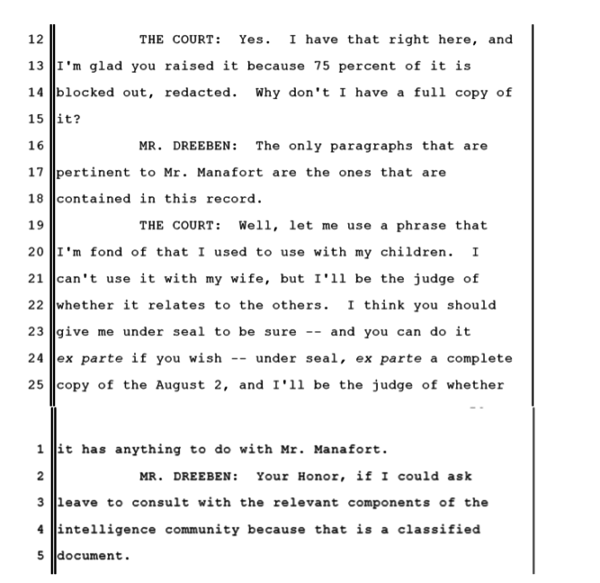
And when Dreeben decided to play coy behind the “classified” label, Ellis decided to have a little fun with this exchange:
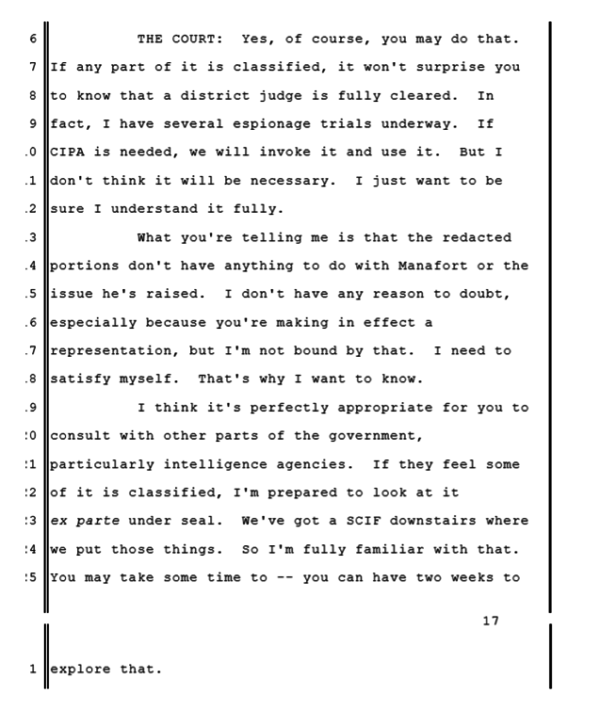
Dreeben, though, missed his cue, and again pushed the “classified” angle when trying to explain why Rosenstein’s May 17 appointment order was necessarily cryptic:

Ellis did a quick brush back to this argument, feigning surprise that Manafort’s case may need to proceed as a Classified Information Procedures Act (“CIPA”) case since the issue had never been raised before.
When called on his bluff, though, Dreeben backed away from the “classified” canard, as seen in this exchange:

8. It’s Not Law Law — It’s These Internal Things
Ellis also called out the Special Counsel’s office for positing that it wasn’t bound by the Department of Justice’s internal regulations governing Special Counsel appointments.
See below:
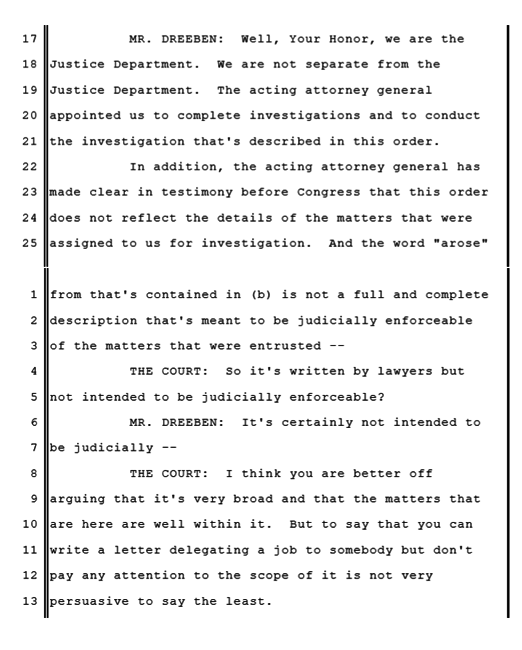
Ellis hammered this point again later:
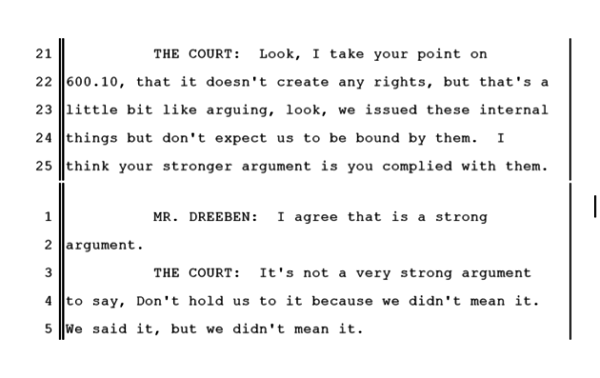
9. Unfettered Power Is Un-American
Then, speaking for Americans who aren’t consumed with hatred for Trump, Ellis proclaimed:
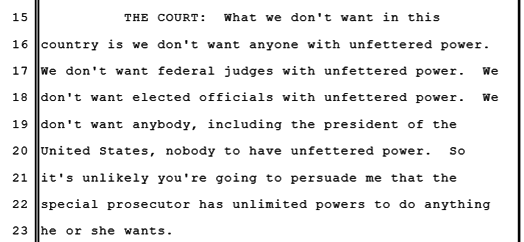
He then asked how much of the $10 million allotted the Special Counsel had been spent, and when the investigation would end.
Dreeben, of course, was not at liberty to say, so Ellis merely put an exclamation point on the matter:

10. I Knew Archie Cox. And You’re A Lot Like Him.
After stressing “that the American people feel pretty strongly about no one having unfettered power,” Ellis recalled a judicial conference in the early ’90s on a special prosecutor.
“I think it was at the Greenbrier,” he said. “I was the chair of that judicial conference. It was a very interesting time. There were many special prosecutors who appeared, including my former constitutional law professor, Archie Cox, and others. So I had a wonderful opportunity to meet and speak to them and hear their variety of views.”
Dreeben interrupted Ellis’ reminiscence to “clarify one thing.”
“We are not operating with unfettered power,” Dreeben said. “We’re operating within a framework of regulations that contemplate regular reporting to the acting attorney general, who is supervising the work of our office within the framework.”
“This is not the Independent Counsel Act that Your Honor was referring to in the conference that you spoke of,” he added. “This is not a separate court-appointed prosecutor who’s operating under statutory independence. We are within the Department of Justice. We’re being supervised by an acting attorney general who has conferred upon us specific jurisdiction and who regularly is in a position to describe to us the metes and bounds of that.”
Ellis found this a difference without a distinction, noting that changes from the earlier-controlling independent counsel scheme to the special counsel paradigm were likely “not significant,” as this portion of the transcript highlights:
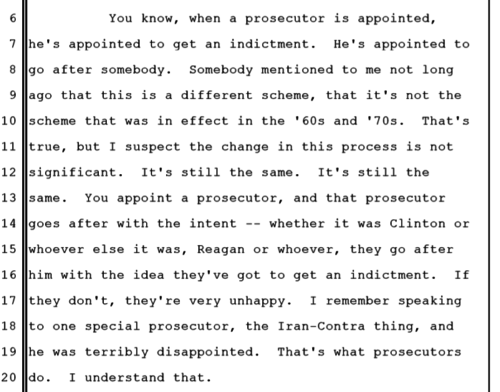
11. Who Invited Cinderella? Ellis Did.
Dreeben also attempted to refute the comparison to Independent Counsels of the past by stressing that Mueller’s team is but one branch of the big happy Department of Justice family. Oh, really, Ellis mentally intoned.
He reminded Dreeben that the Special Counsel’s office had balked when he had suggested bringing in local counsel, but then suddenly Uzo Asonye, from the Eastern District of Virginia, joined the trial team:
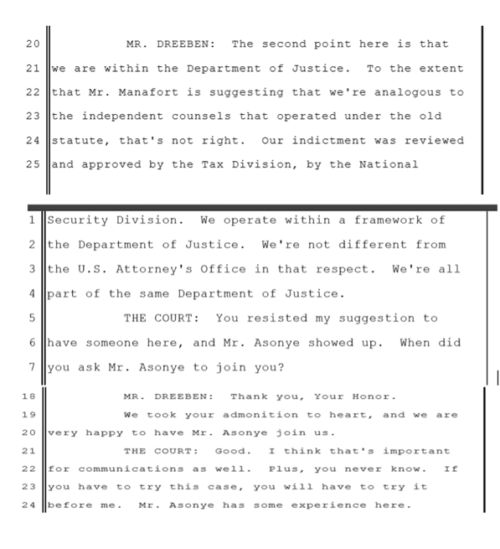
Apparently, that was one hint Mueller’s team did catch.


